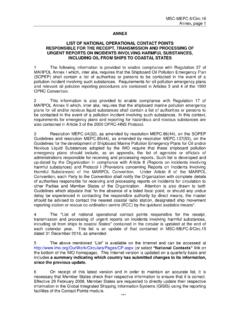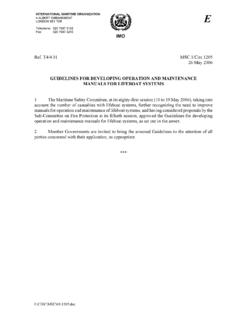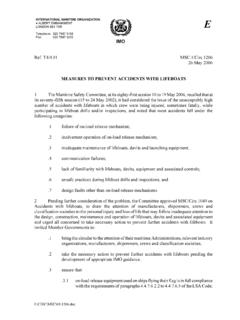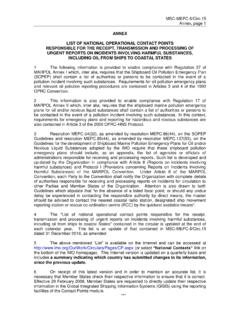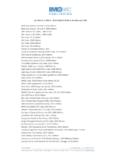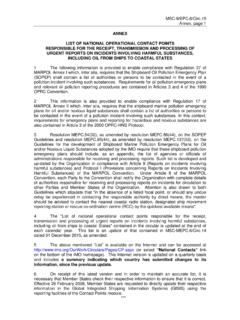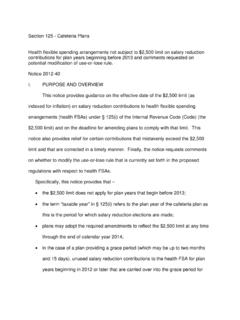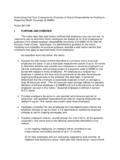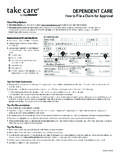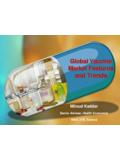Transcription of INTERNATIONAL MARITIME ORGANIZATION FINANCIAL …
1 1 INTERNATIONAL MARITIME ORGANIZATION FINANCIAL STATEMENTS year ENDED 2 TABLE OF CONTENTS Page Secretary-General's Statement 3 Statement I Statement of FINANCIAL Position as at 31 December 2012 17 Statement II Statement of FINANCIAL Performance for the year ended 31 December 2012 19 Statement III Statement of Changes in Net Assets for the year ended 31 December 2012 20 Statement IV Statement of Cash Flow for the year ended 31 December 2012 21 Statement V Statement of Comparison of Budget and Actual Amounts for the year ended 31 December 2012 22 Notes to the FINANCIAL Statements 24 ANNEX 1 (unaudited) 69 ANNEX 2 Opinion of the External Auditor on the ORGANIZATION 's FINANCIAL Statements for the FINANCIAL period ended 31 December 2012 72 3 SECRETARY-GENERAL'S STATEMENT INTRODUCTION 1 In accordance with FINANCIAL regulation , I have the honour to submit to the Council, for its examination and onward transmission to the Assembly, the FINANCIAL statements of the INTERNATIONAL MARITIME ORGANIZATION (IMO) for the year ended 31 December 2012 .
2 2 The Report of the External Auditor on the audit of the 2012 FINANCIAL statements, together with his opinion thereon, are also submitted to the Council as prescribed under FINANCIAL regulation 3 The FINANCIAL statements have been prepared in accordance with the INTERNATIONAL Public Sector Accounting Standards (IPSAS), as prescribed by FINANCIAL regulation , adopted by the Assembly through resolution (26) effective 1 January 2010, and in line with the United Nations policy that IPSAS be used as the accounting standards by United Nations system organizations. 4 In 1948, an INTERNATIONAL conference in Geneva adopted a convention formally establishing the Intergovernmental MARITIME Consultative ORGANIZATION (IMCO). The Convention entered into force in 1958 and the ORGANIZATION came into being in 1959.
3 In 1982, the original name was changed to the INTERNATIONAL MARITIME ORGANIZATION (IMO). The Headquarters of the ORGANIZATION are in London and its complement is approximately 370 staff members, including project staff. IMO's principal place of business, as well as the names and addresses of its General Counsel, actuary, principal bankers and external auditor are indicated at annex to these FINANCIAL statements. 5 Within the meaning of IPSAS, IMO also supervises the World MARITIME University (WMU) and the IMO INTERNATIONAL MARITIME Law Institute (IMLI), the FINANCIAL records of which are presented within these FINANCIAL statements. IMO is not a controlled entity within the meaning of IPSAS, its ultimate decision-making body being its Assembly of 170 Member States, with an elected Council of 40 Member States performing, in accordance with Article 26 of its constitutive Convention, all functions of the Assembly, with the exception of some technical matters, between sessions of the Assembly.
4 6 The purposes of the ORGANIZATION , as summarized in Article 1(a) of its Convention, are "to provide machinery for cooperation among Governments in the field of governmental regulation and practices relating to technical matters of all kinds affecting shipping engaged in INTERNATIONAL trade; to encourage and facilitate the general adoption of the highest practicable standards in matters concerning MARITIME safety, efficiency of navigation and prevention and control of marine pollution from ships; and to deal with administrative and legal matters related to the purposes set out in this Article". 7 The mission statement of IMO is as follows: "The mission of the INTERNATIONAL MARITIME ORGANIZATION (IMO), as a United Nations specialized agency, is to promote safe, secure, environmentally sound, efficient and sustainable shipping through cooperation.
5 This will be accomplished by adopting the highest practicable standards of MARITIME safety and security, efficiency of navigation and prevention and control of pollution from ships, as well as through consideration of the related legal matters and effective implementation of IMO's instruments, with a view to their universal and uniform application." 4 8 IMO, through the development and approval of its Strategic Plan, the most recent of which was approved by the Assembly in November 2011 to cover the period 2012 -2017, has defined 13 strategic directions (SD), which are key to delivering its mission. These are: Enhancing the status and effectiveness of IMO SD 1 IMO is the primary INTERNATIONAL forum for technical matters of all kinds affecting INTERNATIONAL shipping and legal matters related thereto. An inclusive and comprehensive approach to such matters will be a hallmark of IMO.
6 In order to maintain that primacy, it will: .1 further develop its role in MARITIME affairs vis- -vis other intergovernmental organizations, so as to be able to deal effectively and comprehensively with complex cross-agency issues; .2 actively engage the various stakeholders new and existing in the shipping arena, including non-governmental organizations, industry and the public in general, to ensure a more inclusive approach to decision-making; and .3 actively seek to reap synergies and avoid duplicating efforts made by other UN agencies in shipping matters. SD 2 IMO will foster global compliance with its instruments governing INTERNATIONAL shipping and will promote their uniform implementation by Member States. SD 3 With a view to enhancing its contribution to sustainable development, IMO will strengthen its MARITIME capacity-building programmes and will focus on.
7 1 developing capacity-building partnerships with governments, organizations and industry; .2 ensuring the long-term sustainability of the Integrated Technical Co-operation Programme (ITCP); .3 contributing to the achievement of the Millenium Development Goals (MDGs) and relevant outcomes of UNCSD 2012 , including through the development of major projects targeting emerging issues; .4 meeting the needs of its developing Member States; and .5 further improving the delivery, utilization, efficiency and effectiveness of its technical assistance and co-operation programmes. SD 4 Internally, IMO should be able to respond effectively and efficiently to emerging trends, developments, and challenges. It will strive for excellence in governance and management. Besides the Strategic Plan, it will maintain a risk management framework.
8 The Council will provide visionary leadership, Committees will be optimally structured and will be supported by an effective and efficient Secretariat. Within approved biennial appropriations, the Secretariat will be endowed with sufficient resources and expertise to realize the ORGANIZATION 's work plans, and the ORGANIZATION will make effective use of information and communication technology in management and administration. 5 Developing and maintaining a comprehensive framework for safe, secure, efficient and environmentally sound shipping SD 5 IMO's highest priority will be the safety of human life at sea. In particular, greater emphasis will be accorded to: .1 ensuring that all systems related to enhancing the safety of human life at sea are adequate, including those concerned with large concentrations of people.
9 2 enhancing technical, operational and safety management standards; .3 eliminating shipping that fails to meet and maintain these standards on a continuous basis; and .4 increasing the emphasis on the role of the human element in safe shipping. SD 6 IMO will seek to enhance the security of the MARITIME transport network, including vital shipping lanes, and to reduce piracy and armed robbery against ships, as well as the frequency of stowaway incidents, by: .1 promoting a comprehensive and cooperative approach, both among Member States within the ORGANIZATION and between IMO and other intergovernmental and non-governmental organizations; .2 raising awareness of IMO security measures and promoting their effective implementation; .3 raising awareness of IMO measures against piracy and armed robbery against ships and promoting their effective implementation.
10 4 increasing the emphasis on the role of the human element and safeguarding the human rights of seafarers in secure shipping; and .5 increasing the emphasis on safety and security of seafarers. SD 7 IMO will focus on reducing and eliminating adverse impacts by shipping on the environment by: .1 identifying and addressing possible adverse impacts; .2 developing and facilitating the implementation of effective measures for mitigating and responding to the impact on the environment caused by shipping incidents and operational pollution from ships; .3 contributing to INTERNATIONAL efforts to reduce atmospheric pollution and address climate change; and .4 increasing the emphasis on the role of the human element in environmentally sound shipping. SD 8 IMO will seek to ensure that measures to promote safe, secure and environmentally sound shipping do not unduly affect the efficiency of shipping.

